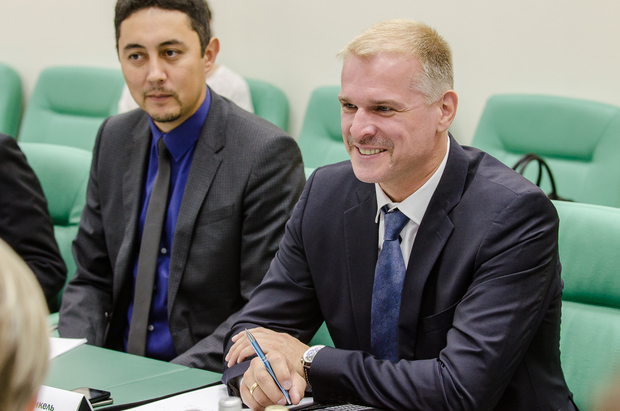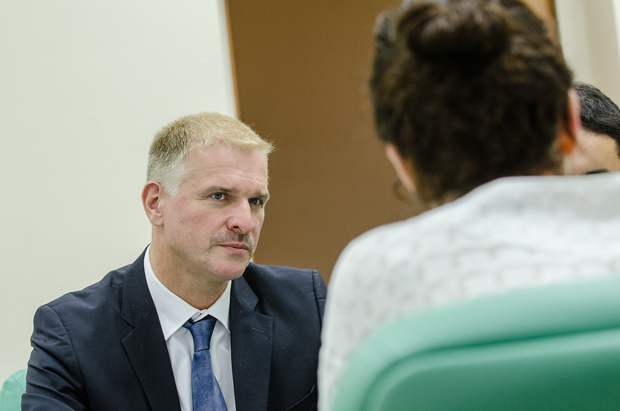Jens Henkel, EPC: ‘In Russia, construction of any building is more expensive than in Europe in principle’
German EPC has sold hundreds of industrial plants to more than 40 countries for 140 years. The administration of the company came to Kazan in order to present multisectoral TAIF holding isocyanate, which is a component for polyurethane production and a novelty for Russia. EPC Group director general Jens Henkel told Realnoe Vremya about the largest projects in Russia, why equipment in renewable power engineering are in low demand now, and what products can be got from wheat high conversion.
A $400 m factory
Mr Henkel, your company has sold a huge amount of equipment during its long history. However, you have arrived in Tatarstan in order to offer a launch of isocyanate production, which is also new for you. Why?
We started to cooperate with Chematur on isocyanate production technology. This project interested us three years ago because Russia doesn't have such a production, while the Russian President gave instructions on import substitution.
In other words, did you start to deal with this production because the Russian market was absolutely free?
Yes, Russia is very interesting for us. But we are also active in the Arab market.
How much will enterprises have to pay for this equipment?
Depending on additional possibilities, this equipment will be about $400m.
What capacity are we speaking about?
About a volume of 150-200,000 tonnes.
What feedstock is needed for production?
It is the most important point. It is why we are actively trying to promote this project in Tatarstan. The republic has all the necessary feedstock for the production. Benzene is the most important component whose volume will increase after the launch of big 600,000-tonne ethylene production lines in Nizhnekamskneftekhim.

Modern isocyanate production is impossible without phosgene
What difficulties did you face while creating the plant?
A great number of experts is needed to launch this production. And, it goes without saying, it is quite a long project. We spent 3 years.
It turned out phosgene, which is quite a dangerous substance, is needed for this production. Is it a safe project?
Firstly, modern isocyanate production is impossible without phosgene. Secondly, the factory presupposed its own big plant for phosgene production. Consequently, transport route is minimum. And, undoubtedly, an additional isolation is presupposed. Moreover, only a necessary volume of phosgene, which is needed for the next process, is produced according to the project. Tanks are not considered at all – everything is processed. Chematur's technology concept means an instantaneous neutralisation of an odd volume of phosgene in case of its overproduction. So there is no danger for the environment. The general safety standard complies with the strictest world requirements.
Who has already been interested in this project?
We have requests from many regions of Russia. As we started to work with Tatarstan and TAIF, we don't speak to other clients because we see that Tatarstan is the republic that has a feedstock and correct administration. And we think this project will be fulfilled here.

Tatarstan is the republic that has a feedstock and correct administration. And we think this project will be fulfilled here
Tendencies in industrial equipment market
You consider your equipment as a resource saving. Could you tell about its peculiarity?
For example, there is an exothermic reaction that releases heat, which used to get steam that generates energy then. So all released heat is used in the same equipment – no drop escapes. Modern standards adopted in the European community are applied to all water, gas purification and waste treatment plants.
According to the official page of the company, you adopted a faster construction due to a thoughtful design. How is it possible to build faster just because of a design?
Indeed, we have such plants, for example, on liquefied natural gas production, which are built very quick. On our production site, everything is done in containers. So everything is assembled much quicker on a client's site than it used to be. But isocyanate production will be different because the volume of design and construction is very big. The process will take at least 3 years, including installation and launch.
You specialise on industrial equipment for different fields of application. What are the current tendencies in the industrial equipment market?
The number of demands for oil and gas has reduced. Equipment that allows to produce polymers from monomers and make an end product has been popular in recent time. And plants that enable to get rid of import dependence and purchase from components of foreign origin are especially popular.
What import substitution projects have you already fulfilled?
Well, Sodium Cyanide Plant in Dzershinsk is an illustrative example. Import of cyanide to Russia stopped after the end of the construction. Our client occupied the market in Russia and is going to build the second stage.
We have worked, for example, on wheat high conversion in recent years. It is possible to get not only flour but also amino acids and chemicals in the end. And here we are also fighting against import. Import of these products accounts for about 100,000 tonnes.
And now we are negotiating with a potential client from the European part of Russia on a very big project on terephthalic acid production, which is a feedstock for polyester, polyethylene terephthalate manufacture that are needed to make a plastic bottle.

Plants that enable to get rid of import dependence and purchase from components of foreign origin are especially popular in the Russian equipment market
In your opinion, what key project have you had in the last 3 years?
There was a big project on construction of a polycarbonate factory in China. And Sodium Cyanide Plant in Dzershinsk that I have mentioned was built from scratch.
How much money was invested in these projects?
Over €200m were spent on Sodium Cyanide Plant. And the 100,000-tonne Polycarbonate Plant in China cost €180m. The licence is completely ours. By the way, we have negotiations with Kazanorgsintez regarding the construction of such equipment there. We hope these negotiations will result in a joint project.
But they already have it. Do you plan to increase their capacities? What volume are you planning to reach?
Yes, we do. Probably we will add 100,000 tonnes more.
Equipment in Russia is more expensive
This summer a subsidiary of EPC has signed a master agreement on technological solutions on liquefied natural gas in our republic. How will the LNG production plant in Tatarstan be forming?
Yes, there was signed an agreement. Unfortunately, the project has not been developed in recent time. It seems there was made a decision we are unfamiliar with.
An analysis of the Russian Ministry of Industry and Energy demonstrated a construction in the Russian petrochemistry from scratch is 20-60% more expensive than construction of analogous capacities in Europe. Do you feel this tendency?
Yes, we feel equipment in Russia is more expensive. First of all, construction of any building in Russia is more expensive than in Europe. Moreover, there are norms. We need to work together with Russian design centres in order to comply with them. Everything needs money.
How do your company reduce costs while constructing factories here?
If during a detailed design we find Russian producers who manufacture quality equipment, we try to use products of local companies while purchasing tankers, installing pumps and during assembly works in order to reduce the prime cost… We don't bring expensive engineers from Germany but attract organisations on the spot.

We don't bring expensive engineers from Germany but attract organisations on the spot
Your company also deals with renewable power engineering. What achievements do you have? Where are your plants used?
These projects have been less popular because of oil price reduction in recent time. These projects stopped being profitable. When oil was $150 per barrel, everybody wanted bioethanol, biodiesel because they were cheaper. The situation has changed now.
What strategic plans in Russia and in the world in the next five years do you have?
Despite recent political difficulties between Germany and Russian, we always have been in touch with our client: we came, met and advised. Now we are yielding the fruits of our work because the demand has increased right now.
There are many projects we would like to fulfil in Tatarstan. I presented them all when I met with President last time. We would like the republic to react to these projects quicker and make decisions quicker because there are many Russian regions. They all want to do something and launch new factories. The first company will be the only one because, for instance, Russian doesn't need the second isocyanate production. The market is not so developed. As for not only isocyanate but also lyocell, viscose, polyacrylonitrile and carbohydrate fibres, there are many projects on which one should make decisions quicker and move further on.
The executive staff of the company comprises of four engineers, and it is one family. Who are they to each other?
The company is located in West Germany. And my father reopened the firm after the German reunification. He delegated the management to his children six years ago.